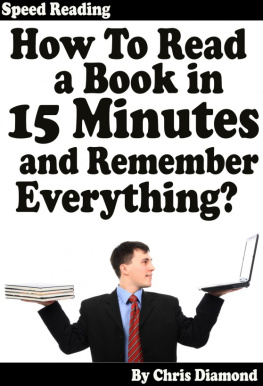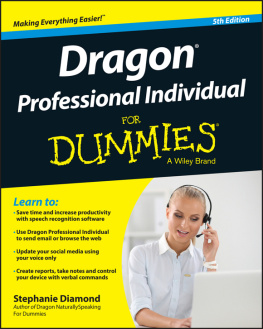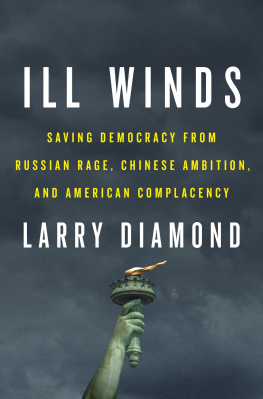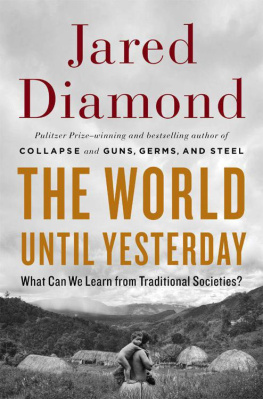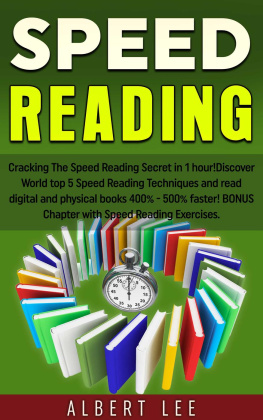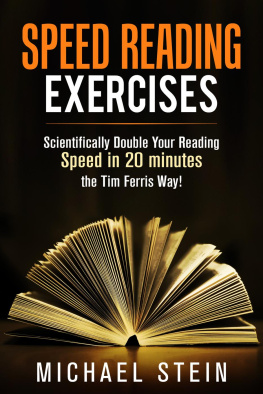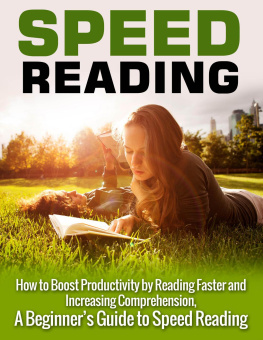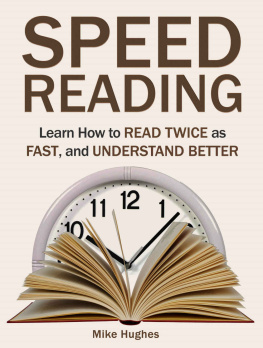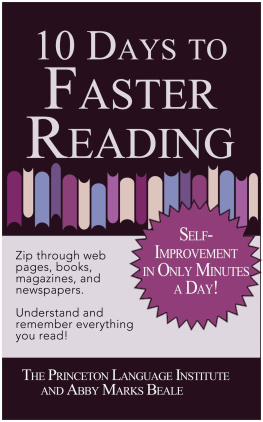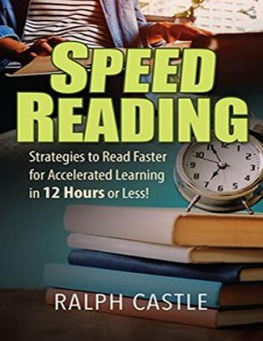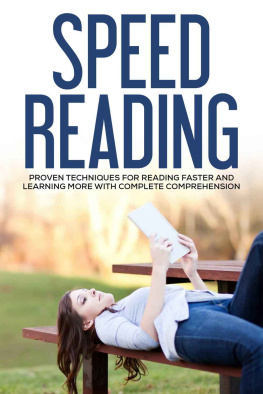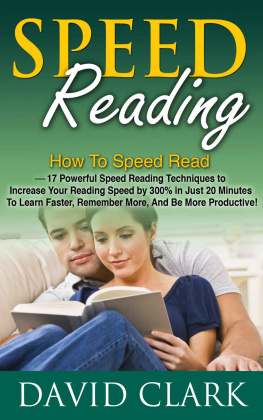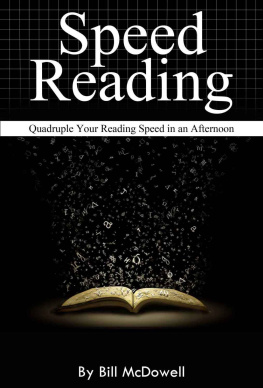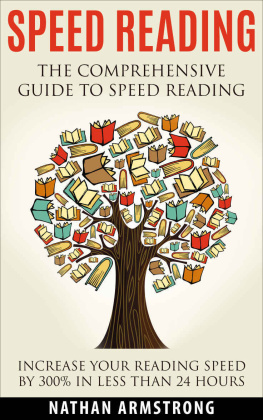How To Read a Book In 15Minutes andRemember Everything?
Chris Diamond
Published by Chris Diamond at Smashwords
Copyright 2012-2014 Chris Diamond
DoubleTimeToday.com
This e-book is licensed for your personal entertainment only.This e-book cannot be re-sold or given away to other people. If youwould like to share this book with another person, please purchasean additional copy for each person. If you are reading this e-bookand you did not purchase it, or it was not purchased for your useonly, then please return to Amazon.com and purchase your own copy.Thank you for respecting the hard work of the author. The authorasserts the moral right to be identified as the author of thiswork!

Intro
You are about to learn some ofthe most important skills reading a single book in just fifteenminutes in any topic of your interest excluding fiction or entertainment books. Weall live busy lives. As we get older, we tend to have lessavailable time. That is because our responsibilities increase, andtherefore, the leisure time decreases.
That is why, you need toknow how to read less and absorb more knowledge on the subject ofyour interest. How should we read a book? Most people think a bookshould be read from cover to cover. That is not the case at all.You do not need to do this because almost 80% of the content in anybook is virtually useless.
If you read non-fictionhow-to books, you need to know how to get the most out of yourtime, when it comes to acquiring new knowledge, in order to bringthe change you want. That is why I created this short e-report toshow you how to read PDF e-books, Hardcover books, magazines, etc.in just fifteen minutes!
The goal is to ACQUIRE MOREknowledge, by reading less. It can be done and I will show youhow!
So, lets getstarted!
Chris Diamond
DoubleTimeToday.com
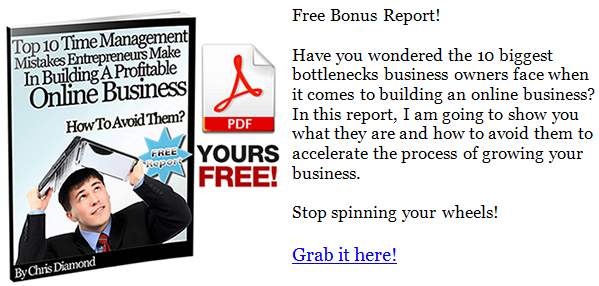
Step 1: Whats Your Outcome?
When you read ANY book onany subject, you need to know why you are reading what you arereading. Most people just collect knowledge, without giving athought of how to utilize that knowledge in order to bring about abetter lifestyle or achieve a certain outcome.
When you can take thelessons learned from this book and resolve real life issues withthose lessons - This is truly a GIFT! It will give you insights onwhat you have to do in order to bring the change you want. There isno value in the knowledge, but only in the implementation of it.When you purchase a book about a particular topic of your interest,you are trying to accomplish a specific outcome. This will help youdetermine what books you should read in the first place.
You do not want to try tolearn everything, even if you have the time. Many things of whatyou learn in the books, may not be implemented right away, andsometimes is forgotten. Collecting a bunch of ideas, seminars,books, and courses is useless, unless you take action, based onwhat you learned immediately. Ideas and insights should becomepractical; they come very quickly when you connect what you alreadyknow with what you just learned.
When we associate newknowledge with certain experience it becomes understanding. Donot collect knowledge, collect experiences based on that knowledge.Having a goal will help you focus on what you need to learn.Everything is filtered through your desired outcome and goals. Ifyou do not have an idea for an outcome, it is best to start withwhat you value. Where do you spend most of your time? If you areputting a tremendous amount of energy on certain activities, thisis probably something you may want to improve on. Therefore, youmight be interested in acquiring more knowledge in order to improvethose skills.
Start with what you alreadyknow, and determine what you have a desire to learn. One of thebiggest enemies of learning is to think you know it all. If you arefamiliar with a topic, but do not understand it completely, yourmind is going to be closed. Therefore, no one is going to convinceyou otherwise, even if its for your own good. Be open to new waysof looking at things, and approach both new ideas and old withconfidence. You want to be open in your search of testing ideas allthe time. Some may work, others may not. Be flexible!
Never believe anything is100%,because there will be always a situation when it is not goingto be true.
Have the courage to fail if you want tosucceed .
Step 2: Learn the Vocabulary of theMain Ideas First
Once you know your desiredoutcome, you need to learn the terms the author ispro bablygoing to use in the book. It will allow you to see how the authorputs ideas in categories and concepts. Often, theres anexplanation of complex words at the end of the book. Terminology isa different language all by itself. Like for example, if you arereading a book on business and financing, you need to know whatROI, revenue, net, gross, passive income, earned income, portfolioincome, etc. mean. If you read books on investing, you need to knowwhat IPO, OPM, OPT, assets, liabilities, depreciation, nonrecoursenote, nonrecourse debt, etc. mean.
Once you learn thevocabulary people use in a particular field, you can grasp conceptsand ideas more easily and clearly. When you come across a word thatyou do not understand, you lose focus of what you are reading. Thatis because when you are reading, you are imagining the words inyour head in a form of a movie.
When you do not understand thevocabulary, it is very difficult to comprehend the meaning of thewords within the c ontext of what you are reading. This is causing people toannoyingly re-read sentences or paragraphs severaltimes.
Learn the vocabulary firstBEFORE you sit down and read a book on a subject you know little ornothing about. This will help you read faster and moreefficiently.
Step 3: Focus on General Laws(Principles)
Laws are general ideas aboutsomething that holds true most of the time. That is because theycan be applied in a variety of differe nt areas. If you take that law, you canpredict what would work in the future.
Focusing on specificprocedures that can change overtime is useless, because you mayhave to learn them all over again. It is more difficult to unlearnthan to learn. Learn it once and use it many times.
Focus on the general law orprinciples that will guide you through life. You can assemble aspecific strategy based on a general law. This will allow you toincrease your success rate dramatically, especially when you applyideas or put them into actions.
We know that not all ideasare of an equal value. Some may work, others may not. Perhaps someideas may serve as obstacles rather than improvements. 90% of thevalue in a book lies within the general laws or principles. If youcomprehend those primary points, you do not need to read the entirebook from cover to cover.
What Does ReadingMean?
Reading a book is a SEARCH forknowledge that would be of a benefit to you as a reader. Theknowledge is hidden, so you have to find it. One of the best speed readingtechniques isto skip 80% of the book!
As you are reading, you are creating a movie inyour head dreaming the book. Thus, you are not even payingattention to the particular words (shape, size or whatever), butyou see the movie you are making out of the meanings of thesewords.
Speed ReadingTechniques
Spend 10 minutes reading the table ofcontents of the book. See what the book is going to cover and whatinformation is behind it.
Look for summaries. Some books havesummaries at the end of every chapter. Some have a summary of thecontents of the book, at the end of the book.
Next page
